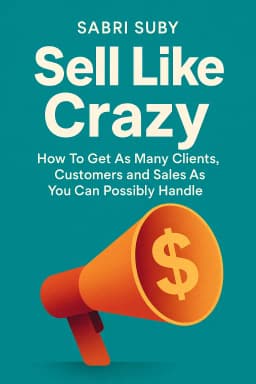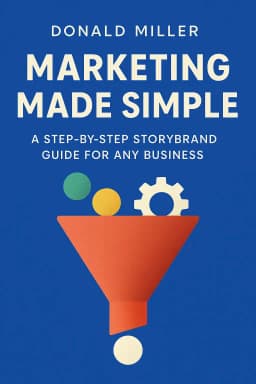
Selling the Uncomfortable Truth
A Guide to Being One-Up, Creating Value, and Becoming Truly Consultative
Golden Hook & Introduction
SECTION
Olivia: The most successful salesperson you'll ever meet probably isn't a smooth talker. They might even be a little awkward. Because in today's world, the most valuable thing they sell isn't a product—it's the uncomfortable truth. Jackson: That is a bold claim. I always picture the top salesperson as the person who could sell ice to a penguin—all charisma and perfect pitches. You're saying the opposite is true? That the best ones are the ones who make you squirm a little? Olivia: Exactly. They make you squirm because they’re showing you a reality you haven't been willing to see. And that’s the entire radical premise of the book we’re diving into today: Elite Sales Strategies: A Guide to Being One-Up, Creating Value, and Becoming Truly Consultative by Anthony Iannarino. Jackson: Anthony Iannarino. I’ve heard his name. He’s a big deal in the sales world, right? Olivia: A very big deal. And what makes his perspective so powerful is that he’s not just some guru shouting from a stage. The man is a machine. He’s written over five thousand articles for his sales blog over more than a decade. But he also grounds that practical experience in theory—he’s an adjunct professor in an MBA program. So he’s living in the trenches but also thinking about it from a 30,000-foot view. Jackson: Okay, so he’s got the credentials. Let’s get back to this "uncomfortable truth" idea. What does that even mean in a sales context? It sounds like a recipe for getting thrown out of an office. Olivia: It can be, if you do it wrong. But if you do it right, it’s the most valuable service you can offer. It’s the core of what Iannarino calls being "One-Up."
The 'One-Up' Mindset: Shifting from Seller to Sherpa
SECTION
Jackson: "One-Up." Okay, I’m already skeptical. That sounds dangerously close to being arrogant or a know-it-all. I can just imagine walking into a meeting and thinking, "I'm One-Up, you're One-Down." How does that not immediately alienate the person you're trying to help? Olivia: That’s the perfect question, because it gets to the heart of the ethical foundation of the book. Being One-Up isn't about feeling superior; it's about having an obligation to guide someone because you possess knowledge or experience they lack. Iannarino tells this incredible personal story that makes it all click. Jackson: I’m listening. Give me the story. Olivia: He was on a trip to Mount Everest, at Basecamp 1, which is at a dizzying 17,000 feet. And he gets hit with severe altitude sickness—tingling sensations, trouble breathing. He’s taking the prescription medicine his doctor back home gave him, but he’s only getting worse. Jackson: That sounds terrifying. You’re in one of the most remote places on Earth and your body is failing. Olivia: Exactly. So, in desperation, he talks to one of the Sherpa guides. The Sherpa, who has likely never seen the inside of a medical school, takes one look at the medicine and tells him, "This is what's making you sick. Throw it away." Jackson: Whoa. So he’s got his doctor, a trained medical professional, on one shoulder, and a local guide on the other, telling him to do the exact opposite. Olivia: And it gets better. The Sherpa then gives him this completely counterintuitive advice. He says, "You need to walk faster. You're not getting enough air." Now, every instinct in your body when you can't breathe is to slow down, to conserve energy. But Iannarino is desperate, so he trusts the Sherpa. He throws away the pills and starts walking faster. Jackson: And what happened? Olivia: His symptoms started to disappear. The tingling stopped, his breathing eased. In that moment, the Sherpa, with his decades of lived experience at high altitude, was profoundly "One-Up." His practical knowledge was more valuable than the doctor's degree. He wasn't being arrogant; he was saving Iannarino from a potentially life-threatening situation by sharing a truth that Iannarino couldn't see. Jackson: Okay, that’s a powerful image. The Sherpa isn't selling him anything. He's guiding him. So being One-Up is about having that kind of situational expertise. Olivia: It is. And it comes with a heavy responsibility. The book even quotes the famous line from Spider-Man's Uncle Ben: "With great power comes great responsibility." The power of being One-Up isn't for you to exploit the client; it's to serve them. It’s an ethical duty to prevent them from making a mistake, just like the Sherpa did. Jackson: But how do you do that without making the client feel "One-Down" and, frankly, a bit stupid? No one likes being told their plan is wrong. Olivia: The book has a simple rule for this: "Never make the other person feel One-Down." You don't do it with condescension. You do it by providing context, by sharing insights, and by framing the conversation in a new way. Which brings us to the idea that the sales conversation itself is the most important product you have.
The Modern Sales Conversation: Your Only Vehicle for Value
SECTION
Jackson: Okay, so you've got the Sherpa mindset. You know something the client doesn't. But how do you actually deploy that in a meeting? You can't just walk in and say, "I've climbed this mountain before and you're about to walk off a cliff." Olivia: You can't. And that's why Iannarino argues that the legacy approach to sales is completely broken. The old script of "Hi, let me tell you about my great company, here are our clients, now what are your pain points?" is dead. It’s commoditized. Everyone does it. Jackson: I’ve sat through that meeting a hundred times. My eyes glaze over the second the PowerPoint slide with the company history comes up. Olivia: We all have! Iannarino shares this story about being at a sales conference and watching these two "hustlers" on stage. They were using high-pressure tactics, publicly cornering prospects to buy a program they didn't need, playing on their egos. He was so disgusted by the manipulation that he checked out of his hotel and flew home early. Jackson: That's a strong reaction. Olivia: Because it represents everything the One-Up approach is not. That’s narrative warfare for selfish gain. The modern, One-Up conversation is the opposite. It creates value for the client from the very first sentence. He tells another story that shows this perfectly. He was invited to a meeting with a major prospect, and the senior decision-maker walks in and says the dreaded words: "So, tell me about your company and what you do." Jackson: The classic opener. The moment you're supposed to launch into your pitch. Olivia: Right. But Iannarino doesn't. He looks at this very important, very busy executive and says, "That would be a waste of your time." Jackson: Gutsy. I'm not sure I could pull that off. Olivia: It's incredibly gutsy. But then he follows it up. He says something like, "Instead, let me share what we're seeing in the market, the complex forces that are likely causing the very problems you're experiencing right now." He pulls out a legal pad—no slides, no laptop—and for the next hour, he just explains the client's world back to them with a higher-resolution lens. He gives them context. Jackson: And the executive stayed for an hour? Most of them are checking their watch after five minutes. Olivia: He was riveted. Because Iannarino wasn't talking about himself. He was talking about the client. He was creating immense value right there in the conversation. He shifted the focus from "Why us?" to "Why change?" He was teaching, not selling. That, the book argues, is the new rapport. It’s not about finding out if you both like golf; it’s about establishing that you are a serious business person with valuable insights. Jackson: So you have to stop the commoditized discovery questions like "What keeps you up at night?" and instead start with something like, "Here's what should be keeping you up at night, and here's why." Olivia: Precisely. You are helping the client discover something about themselves. You’re providing the "aha" moment. The book is full of these practical stop-and-start shifts. Stop trying to build personal rapport first; start by proving your business acumen. Stop differentiating your solution; differentiate yourself in the conversation. Jackson: This is great for getting in the door and having a powerful first meeting. But what happens when you're in a formal process, up against three other companies in a bake-off? How do you stay One-Up when the client is trying to commoditize you in an RFP? Olivia: Ah, now you're asking about the black-belt level of being One-Up. For that, Iannarino has a brilliant and surprisingly political strategy.
The Triangulation Strategy: Rising Above the Competition
SECTION
Jackson: A political strategy? In sales? This sounds interesting. Olivia: It's called the Triangulation Strategy, and he borrows the concept directly from the political advisor Dick Morris, who famously used it to get Bill Clinton elected president. Jackson: Okay, now I'm really intrigued. How does a presidential campaign connect to B2B sales? Olivia: In the 90s, Clinton was stuck between the traditional Democratic party line and the Republican party line. Morris advised him to "triangulate"—to take a position above the two parties, blending the best ideas from both sides and creating a third, transcendent position. He wasn't just another politician in the fight; he was the reasonable referee rising above it. Jackson: So he wasn't just playing the game, he was reframing the entire board. Olivia: Exactly! And Iannarino argues that a One-Up salesperson must do the same thing. When you're in a competitive situation, you don't attack your competitor. That makes you look petty and defensive. You attack their model. Jackson: What do you mean by their "model"? Olivia: Every industry has a value continuum. Think about restaurants. You have McDonald's, which is a commodity model—it's cheap and fast, but you make concessions on quality and experience. Then you have a high-end steakhouse, a strategic partner model—it's expensive, but you get incredible service and quality. Neither is inherently "bad," but they are right for different contexts. Jackson: Right, you wouldn't take a first date to McDonald's, and you wouldn't take a busload of kids to a fancy steakhouse. Olivia: Precisely. The One-Up salesperson uses triangulation to educate the client on the different models available in their industry. You "sing the praises and confess the sins" of each one. You might say, "Look, Company A is a low-cost provider. They're great if your primary goal is to save money, but you'll have to concede on service levels and innovation. Company B is a massive global firm, which gives you scale, but you'll be dealing with bureaucracy and slower decision-making. Our model is different. We're a high-touch, consultative partner..." Jackson: Ah, I see. You're not saying "our competitor is bad." You're saying "their approach has these inherent trade-offs, and here's why that approach is wrong for you, in this specific situation." You become the trusted advisor helping them navigate the landscape. Olivia: You become the critic reviewing all the movies, not just another actor auditioning for the part. You're helping the director—the client—understand the whole world of cinema. You're asking them the crucial question: "Have you decided what delivery model is right for you?" Most clients have never even thought in those terms. Jackson: And by framing it that way, you've already won half the battle. You've elevated the conversation from price to strategy. Olivia: You've completely changed the game. The book tells a story about how Iannarino would disrupt the RFP process. He’d get a rigid RFP and call the contact, not to answer the questions, but to question the questions themselves. He’d say something like, "Your questions here are written in a way that doesn't allow us to describe how we can actually deliver a better result. How do you want us to show you a newer, better approach?" He triangulates by positioning the RFP itself as an outdated model.
Synthesis & Takeaways
SECTION
Jackson: So the thread connecting all of this—the Sherpa mindset, the value-driven conversation, the triangulation strategy—is that modern selling has evolved from a game of persuasion to a game of insight. You win by knowing more, and frankly, by caring more about the client's outcome than the deal itself. Olivia: Exactly. The ultimate test of being One-Up, as Iannarino puts it, isn't closing a deal; it's causing the client to change for the better. Not just changing their supplier, but changing their beliefs, their actions, and their results. The book argues that if you have to give a hard sell on your solution at the end of the process, it’s a sure sign you failed to create enough value in the conversations that came before. Jackson: That’s a really high bar. It reframes the entire profession. It’s not about being a vendor; it’s about being a catalyst. Olivia: It is. And it’s why the book has been so well-regarded, even if some find the "One-Up" language a bit blunt. It’s a call for salespeople to take on a role of true leadership. It's a demanding philosophy, but it’s also an incredibly empowering one. Jackson: It really makes you think. It’s a challenge to anyone in a role where they advise others. Olivia: It is. So for everyone listening, the question to ask yourself after this isn't "How can I sell better?" I think the book would want you to ask, "What do I know, or what could I learn, that could genuinely change my client's business for the better?" The answer to that question is where the real value lies. Jackson: A powerful thought to end on. Olivia: This is Aibrary, signing off.









